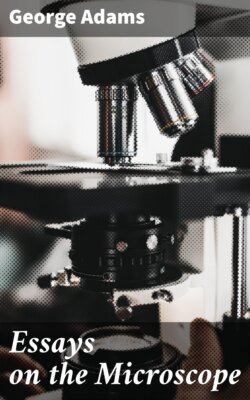Читать книгу Essays on the Microscope - George Comp Adams - Страница 10
На сайте Литреса книга снята с продажи.
Оглавление[22] Description des Nouveaux Microscopes inventes par M. Æpinus.
Fig. 1. Plate III, represents the improved lucernal microscope.
Fig. 1. Plate IV. The improved compound and single microscope.
Fig. 2. Plate IV. The best universal compound microscope.
Fig. 3. Plate IV, is what is usually called Culpeper’s, or the common three pillared compound microscope.
Fig. 1. Plate V, represents Martin’s solar opake microscope.
Fig. 4. Plate VI, is a picture of the common solar microscope.
Fig. 1. Plate VII. A, is Cuff’s common compound microscope.
Fig. 3. Plate VIII. Martin’s new microscopic telescope, or convenient portable apparatus for a traveller.
We cannot conclude this chapter better than with the following observations on the microscope. We are indebted to it for many discoveries in natural history; but let us not suppose that the Creator intended to hide these objects from our observation. It is true, this instrument discovers to us as it were a new creation, new series of animals, new forests of vegetables; but he who gave being to these, gave us an understanding capable of inventing means to assist our organs in the discovery of their hidden beauties. He gave us eyes adapted to enlarge our ideas, and capable of comprehending a universe at one view, and consequently incapable of discerning those minute beings, with which he has peopled every atom of the universe. But then he gave properties and qualities to matter of a particular kind, by which it would procure us this advantage, and at the same time elevated the understanding from one degree of knowledge to another, till it was able to discover these assistances for our sight.
It is thus we should consider the discoveries made by those instruments, which have received their birth from an exertion of our faculties. It is to the same power, who created the objects of our admiration, that we are ultimately to refer the means of discovering them. Let no one, therefore, accuse us of prying deeper into the wonders of nature, than was intended by the great author of the universe. There is nothing we discover by their assistance, which is not a fresh source of praise; and it does not appear that our faculties can be better employed, than in finding means to investigate the works of God.
From a partial consideration of these things, we are very apt to criticise what we ought to admire; to look upon as useless what perhaps we should own to be of infinite advantage to us, did we see a little farther; to be peevish where we ought to give thanks; and at the same time to ridicule those who employ their time and thoughts in examining what we were, i. e. some of us most assuredly were created and appointed to study. In short, we are too apt to treat the Almighty worse than a rational man would treat a good mechanic, whose works he would either thoroughly examine, or be ashamed to find any fault with them. This is the effect of a partial consideration of nature; but he who has candor of mind, and leisure to look farther, will be inclined to cry out:
How wond’rous is this scene! where all is form’d
With number, weight, and measure! all design’d
For some great end! where not alone the plant
Of stately growth; the herb of glorious hue,
Or food-full substance! not the laboring steed,
The herd, and flock that feed us; not the mine
That yields us stores for elegance and use;
The sea that loads our table, and conveys
The wanderer man from clime to clime, with all
Those rolling spheres, that from on high shed down
Their kindly influence; not these alone,
Which strike ev’n eyes incurious, but each moss,
Each shell, each crawling insect, holds a rank
Important in the plan of Him, who fram’d
This scale of beings; holds a rank, which lost,
Would break the chain, and leave behind a gap
Which nature’s self would rue. Almighty Being,
Cause and support of all things, can I view
These objects of my wonder; can I feel
These fine sensations, and not think of thee?
Thou who dost thro’ th’ eternal round of time,
Dost thro’ th’ immensity of space exist
Alone, shalt thou alone excluded be
From this thy universe? Shall feeble man
Think it beneath his proud philosophy
To call for thy assistance, and pretend
To frame a world, who cannot frame a clod?—
Not to know thee, is not to know ourselves—
Is to know nothing—nothing worth the care
Of man’s exalted spirit:—all becomes,
Without thy ray divine, one dreary gloom,
Where lurk the monsters of phantastic brains,
Order bereft of thought, uncaus’d effects,
Fate freely acting, and unerring chance.
Where meanless matter to a chaos sinks,
Or something lower still, for without thee
It crumbles into atoms void of force,
Void of resistance—it eludes our thought.
Where laws eternal to the varying code
Of self-love dwindle. Interest, passion, whim,
Take place of right and wrong, the golden chain
Of beings melts away, and the mind’s eye
Sees nothing but the present. All beyond
Is visionary guess—is dream—is death.[23]
[23] Stillingfleet’s Miscellaneous Tracts.
